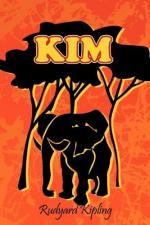‘This is a good land — the land of the South!’ said he. ’The air is good; the water is good. Eh?’
‘And they are all bound upon the Wheel,’ said the lama. ’Bound from life after life. To none of these has the Way been shown.’ He shook himself back to this world.
‘And now we have walked a weary way,’ said Kim. ’Surely we shall soon come to a parao [a resting-place]. Shall we stay there? Look, the sun is sloping.’
‘Who will receive us this evening?’
‘That is all one. This country is full of good folk. Besides’ he sunk his voice beneath a whisper — ‘we have money.’
The crowd thickened as they neared the resting-place which marked the end of their day’s journey. A line of stalls selling very simple food and tobacco, a stack of firewood, a police-station, a well, a horse-trough, a few trees, and, under them, some trampled ground dotted with the black ashes of old fires, are all that mark a parao on the Grand Trunk; if you except the beggars and the crows - both hungry.
By this time the sun was driving broad golden spokes through the lower branches of the mango-trees; the parakeets and doves were coming. home in their hundreds; the chattering, grey-backed Seven Sisters, talking over the day’s adventures, walked back and forth in twos and threes almost under the feet of the travellers; and shufflings and scufflings in the branches showed that the bats were ready to go out on the night-picket. Swiftly the light gathered itself together, painted for an instant the faces and the cartwheels and the bullocks’ horns as red as blood. Then the night fell, changing the touch of the air, drawing a low, even haze, like a gossamer veil of blue, across the face of the country, and bringing out, keen and distinct, the smell of wood-smoke and cattle and the good scent of wheaten cakes cooked on ashes. The evening patrol hurried out of the police-station with important coughings and reiterated orders; and a live charcoal ball in the cup of a wayside carter’s hookah glowed red while Kim’s eye mechanically watched the last flicker of the sun on the brass tweezers.
The life of the parao was very like that of the Kashmir Serai on a small scale. Kim dived into the happy Asiatic disorder which, if you only allow time, will bring you everything that a simple man needs.
His wants were few, because, since the lama had no caste scruples, cooked food from the nearest stall would serve; but, for luxury’s sake, Kim bought a handful of dung-cakes to build a fire. All about, coming and going round the little flames, men cried for oil, or grain, or sweetmeats, or tobacco, jostling one another while they waited their turn at the well; and under the men’s voices you heard from halted, shuttered carts the high squeals and giggles of women whose faces should not be seen in public.




